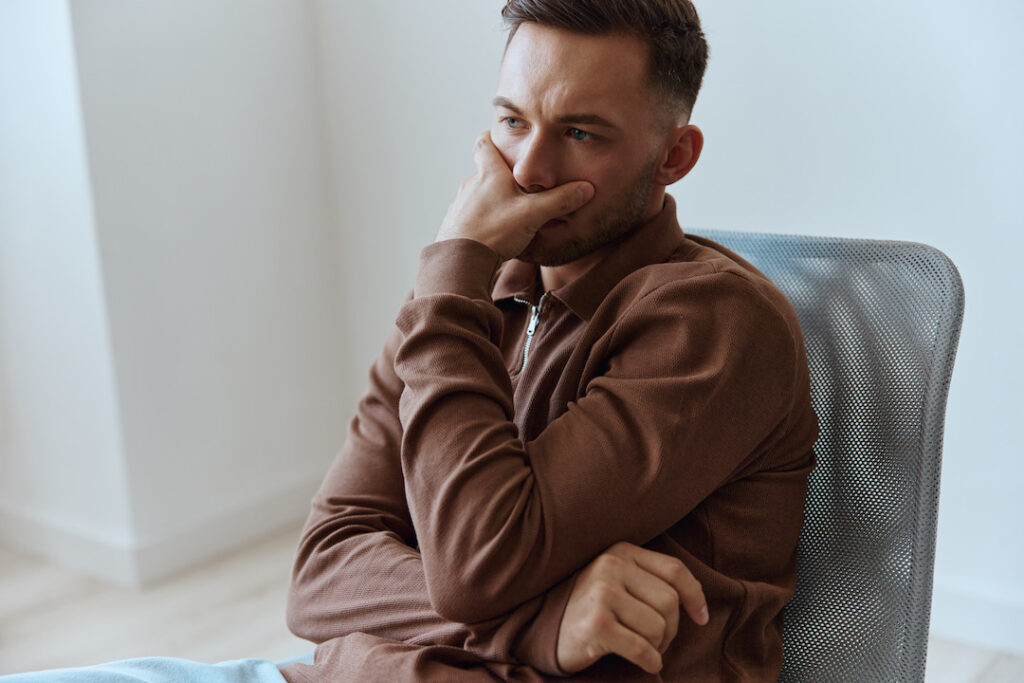You were at a social event for work. Cocktails and champagne were being passed around to sip on throughout the evening. You knew many of the people there, and you were having a good time sipping and chatting. The slight buzz of the alcohol helped relieve any nerves you had about some of the newcomers present. It was a lovely time.
When you were back home later that night, however, some thoughts began to creep in. Did people actually like you at the event? What if they were judging you for what you drank? Was that joke you made actually funny, or were people laughing at you instead? Were you going to show up to work tomorrow and have your coworkers staring and snickering at you?
This feeling you were experiencing was likely caused by the alcohol you drank earlier that evening. Alcohol and anxiety have an interesting relationship. At Pacific Sands, our team believes in having a solution-focused approach to client care and wellness. This same approach extends beyond our doors. With an average of nearly 24 gallons of alcohol consumed per person each year in California, we want to make the connection between alcohol and anxiety well-known. When people can identify where their side effects are coming from, they can make well-informed decisions about their health, so let’s dive into the relationship between alcohol and anxiety.
Why Does Drinking Alcohol Sometimes Cause Anxiety?
Despite the fact that alcohol is classified as a depressant, meaning it slows down things within the body, it also has properties of a stimulant. It releases dopamine when consumed, and can also give the consumer a burst of energy at first, as well as elevate heart rate for a period of time.
Dopamine is the reward chemical within the body. It’s released whenever you do something you enjoy, including simple pleasures such as eating or having sex. It makes us feel good. The main theory of why drinking can cause anxiety is because of the reaction we have when the boosted levels of dopamine decrease. This loss of the reward chemical can sometimes translate to anxiety.
How Alcohol Can Cause Anxiety (or Make it Worse)
Besides the fluctuation of dopamine levels within the body, there are other reasons that alcohol can cause anxiety.
When we drink alcohol, we are at a much higher risk of participating in risky activities like drinking while under the influence or having unsafe sex. After you drink, you might look back on decisions you’ve made and worry or stress over them.
Additionally, those who have an alcohol use disorder can experience anxiety as a more long-term side effect.
What Is Hangxiety and How Can I Avoid It?
The term “hangxiety” was invented to describe the period after consuming alcohol, usually during the common “hangover” phase, where you experience anxiety or depression as a consequence of your drinking.
Depending on your level of alcohol consumption, the best way to avoid hangxiety is to consume lower levels of alcohol. Additionally, if you have an untreated anxiety disorder or depressive disorder, seeking treatment for that can also help alleviate some symptoms.

Alcohol Use Disorders and Mental Health
The connection between alcohol use disorders and mental health is a strong one. There are two primary ways they can be connected.
The first is when someone utilizes alcohol to treat their mental health conditions. Some people drink to relieve stress, forget about trauma, or feel a rush of dopamine to ignore their depression for a while. Continuing to utilize alcohol as a coping mechanism can lead to an alcohol use disorder while potentially worsening the symptoms of the mental health condition at the same time.
The second is when someone develops a mental health condition because of their alcohol use. Alcohol, especially when consumed frequently or in large quantities, impacts the brain over time. The way it alters the chemicals and neurotransmitters in your brain can contribute to an increased feeling of depression or anxiety. These symptoms can occur during or after drinking.
Is Anxiety a Symptom of an Alcohol Use Disorder?
Anxiety can be a symptom of an alcohol use disorder. This is primarily the case whenever anxiety is developed throughout the history of your consumption of alcohol. If you were already managing an anxiety disorder before your start of alcohol consumption, then it’s not a strong indicator of an alcohol use disorder.
Alongside anxiety, here are some other common signs of an alcohol use disorder.
- Experiencing withdrawal symptoms when you don’t drink
- Needing to drink more to feel the same effects
- Spending most of your day thinking about alcohol, consuming alcohol, and recovering from alcohol
- Alcohol use impacts relationships and job performance
- Quitting activities you used to love in favor of alcohol use
- Craving alcohol whenever you’re not consuming it
How to Recognize the Symptoms of Alcohol-Induced Anxiety
For those who haven’t experienced anxiety, it can be hard to recognize. When you’re experiencing anxiety, the thoughts and feelings you’re having seem reasonable, despite the fact that they are not. Once you’re able to pinpoint what anxiety feels like for you, it can be easier to navigate around it or address it after the fact.
If you experience any of these symptoms after a period of consuming alcohol, these could be an indicator of alcohol-induced anxiety. The most common symptoms are a racing heart, trouble sleeping, a feeling of impending doom, increased irritation and restlessness, trouble concentrating, and increased feelings of panic. Oftentimes, these feelings don’t come from an obvious source.
Coping Mechanisms for Anxiety
Anxiety can invoke sensations that aren’t related to reality. This means you might feel panicked even when in a non-threatening situation. You might jump at the sound of your AC turning on. You might overthink scenarios that are out of your control or that haven’t had a negative effect in the past.
If you’re managing an anxiety disorder, whether caused by alcohol or not, there are some ways you can help yourself right from the comfort of your home.
Take note of the times you’re feeling anxious and if anything specific triggers it or makes it worse. If things are triggering you that you can alter, do so. Try and change up your setting or give yourself time to sit and breathe. Distracting the brain does wonders for addressing anxiety, depression, and more. No matter what happens, remember that you can get through it and it won’t last forever.
The Primary Risk Factors for Anxiety with Drinking
Who is most at risk for experiencing anxiety after drinking?
Those who are already managing a mental health condition like depression or anxiety are at an increased risk of feeling anxious once the effects of alcohol wear off. The fluctuation in dopamine levels will be more noticeable to you and have a higher chance of triggering depression or anxiety once it lowers.
Additionally, those with an alcohol use disorder are more likely to develop anxiety disorders over the course of their alcohol consumption.
No matter the cause, anxiety can always be treated just as much as an alcohol use disorder can be.
Alcohol and Panic Attacks
Not all who have anxiety disorders have panic attacks, but you don’t need to have an anxiety disorder to experience one. Panic attacks occur during heightened levels of stress and anxiety. It’s when the body reacts as though it is in imminent danger and normally shuts down as a response.
A panic attack often involves sweats, chills, a racing heart, chest pain, tingling in the body, numbness, difficulty breathing, and more. Many describe it as feeling like someone is clenching your heart or stepping on your chest. It can seem very overwhelming, but it will pass with time.
Panic attacks may occur as a result of alcohol consumption in some cases. The odds are higher for those who are already managing a panic attack disorder or other form of anxiety disorder.

How to Seek Help for Anxiety and Alcohol Use in California
When you’re seeking help for an alcohol use disorder as well as an anxiety disorder, it can seem like your options might be limited. It’s important to find a place that will treat both at the same time so you’re set up for long-term success.
Having two or more disorders like this is known as a dual diagnosis. It’s more common than many might think, and it’s very important that both are addressed equally as they often tend to impact one another. If you address the alcohol but not the anxiety, someone might be more likely to return to use to manage the symptoms of their untreated anxiety. This can be true in the reverse, as well.
Here at Pacific Sands, not only do we offer a dual diagnosis treatment program, but with our intimate setting and hands-on staff, you’ll be sure to get the care you need to find healing.
Our team at Pacific Sands is here for you. We work with you on an individualized level to make an alcoholism treatment plan that suits your needs and schedule. There’s no wrong time to start your recovery journey with us by your side. Give us a call anytime at 949-426-7962 and we’ll be happy to help in any way we can. The first step towards a new life.
